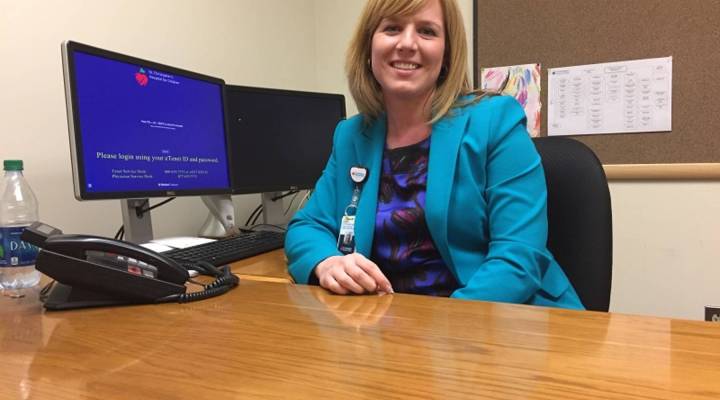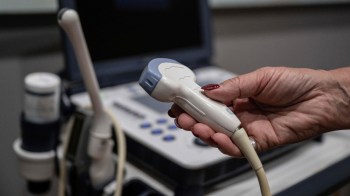
New paper chase: law school for non-lawyers

Hospitals can be noisy places, children’s hospitals especially. But at St. Christopher’s Hospital for Children in North Philadelphia, there’s one sound that cuts through the din: the clack of Cheryl Kettinger’s heels as she makes her rounds.
“People always say to me ‘I hear you coming,’” said Kettinger.
Doctors and nurses may prefer flats and clogs. But Kettinger isn’t a doctor or a nurse. She’s a law school graduate. She’s also not a lawyer. Her area is compliance. She helps interpret medical law and create company guidelines so people don’t break those laws.
“My whole goal is to find a way to do things the right way,” said Kettinger.
Before she landed her current gig, Kettinger got her master’s of jurisprudence — or M.J. — in health law at Widener University’s Delaware Law School just outside Wilmington. There she met a whole host of people like her — people who worked with the law, but weren’t lawyers.
“I had OR nurses in my class. You had people in the pharmaceutical industry, social workers. So it gave me a broader base of classmates,” said Kettinger.
That broad base of classmates — those are the people Delaware Law is betting its future on.
The law school business model used to be simple. You recruit a bunch of aspiring lawyers. Those aspiring lawyers pay a lot of money. Three years later — and after a few hundred nights in the law library — the aspiring lawyers graduate and become lawyers.
The model worked fine, until the recession hit U.S. law firms. With fewer jobs available, a lot of aspiring lawyers decided they should aspire to something else. So what does a law school do when there aren’t enough aspiring lawyers left to educate? They start to look for students in places you wouldn’t expect — places like hospitals.
Rod Smolla, dean at Delaware Law School, says close to a third of the school’s students are now in non-JD programs.
“And I can easily imagine it going bigger,” said Smolla. “I can imagine it being half of what we do.”
Most of Delaware Law’s new programs are for people in higher ed, healthcare or finance. It’s law school for non-lawyers.
“That’s a whole new thing for law schools,” said Smolla. “And it’s good for us in terms of expanding our revenue streams and diversifying our portfolio.”
Delaware Law needs to diversify. Enrollment in its traditional J.D. program has fallen by almost 50 percent since 2011. Smolla doesn’t think those folks are ever coming back.
“I would be delighted if it just held very steady and stable indefinitely,” said Smolla. “In contrast, where there’s real entrepreneurial growth is on the non-J.D. programs.”
Delaware Law’s M.J. degrees cost about $30,000 apiece, take one or two years to complete, and are taught totally online. More and more law schools now rely on these non-J.D. programs. Nationwide, non-J.D. enrollment at law schools spiked 45 percent between 2007 and 2013, according to the American Bar Association.
But is that a good thing?
Kyle McEntee, executive director of Law School Transparency, a watchdog group that monitors legal education, isn’t so sure. “We are in a period of innovation right now and any time you’re in a period of innovation you’re concerned about the type of quality that’s being produced,” said McEntee.
He worries schools like Delaware Law are simply creating new degrees as a cash grab — not because people actually need them.
“And so I think there’s a deep skepticism about the value of these programs,” said McEntee.
Cheryl Kettinger has faced that skepticism head on. She recalls one moment in a recent job interview when someone noticed the M.J. on her resume. “He said, You don’t want to know what I have to say about this,” said Kettinger.
But she still got the job. And she still argues with her now-coworker about the value of that M.J. degree. And that’s not surprising. After all, she said, he is an attorney.
There’s a lot happening in the world. Through it all, Marketplace is here for you.
You rely on Marketplace to break down the world’s events and tell you how it affects you in a fact-based, approachable way. We rely on your financial support to keep making that possible.
Your donation today powers the independent journalism that you rely on. For just $5/month, you can help sustain Marketplace so we can keep reporting on the things that matter to you.


















